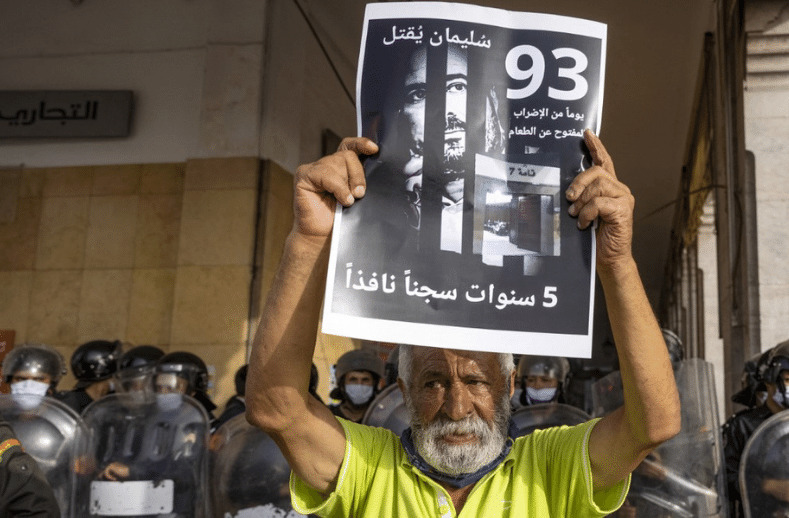Paris-Geneva, 29 July 2022. After more than two years of arbitrary detention, journalist Soulaiman Raissouni had his personal belongings confiscated during an unfounded transfer to another prison. The Observatory for the Protection of Human Rights Defenders (International Federation for Human Rights - FIDH and World Organisation Against Torture - OMCT) deplores this attack and the ill-treatment Raissoni is subjected to in prison and urges the national authorities to immediately release him and all human rights defenders arbitrarily detained in Morocco.
On the evening of 27 May 2022, Mr. Soulaiman Raissouni, former Chief Editor of the independent Arabic-language newspaper Akhbar Al Yaoum, known for its editorials criticising the Moroccan security services and the public prosecutor’s office, was transferred from Oukacha prison in Casablanca to Ain Borja prison also in Casablanca. Neither Mr Raissouni nor his lawyers were told the reason for this move. During the transfer, prison authorities confiscated all the documents he had written in prison, including his prison diary and the draft version of a novel. The plea, which Raissouni had written and which the judge had authorised him to bring to the hearings and read in court, was also confiscated. Furthermore, his belongings, especially his books, were damaged, and all pages containing words or notes in the margin were torn out.
To protest against these flagrant violations of his fundamental rights, Mr. Raissouni decided to refuse his right to family visits, his right to communicate with his lawyers (except once) and his right to take walks. Hence, it is no longer possible to obtain reliable information about his health and conditions of detention, thereby increasing the risk of his being ill-treated by prison authorities.
The Observatory explained that Soulaiman Raissouni had been arrested on 22 May 2020 in Casablanca and placed in pre-trial detention in Oukacha prison for "indecent assault with violence and sequestration" after an anonymous message published on social networks accused him of attempted rape, and a complaint was filed against him; he has systematically denied these accusations. On 23 February 2022, the Casablanca Court of Appeal sentencedMr. Raissouni to five years’ imprisonment and a fine of 100,000 dirhams (approximately 9,365 euros) as compensation for the complainant for "indecent assault with violence and sequestration", thus confirming the 9 July 2021 judgement of the Casablanca Court of Appeal
During his detention, Soulaiman Raissouni went on a 122-day hunger strike, which did serious harm to his health, in protest against his arbitrary detention and to claim his right to a fair trial. He had been denied proper medical care and, for various reasons, was deprived of family visits for several weeks. Furthermore, the trial and proceedings against Mr. Raissouni since his arrest have been tainted with numerous irregularities and clear violations of the right to a fair trial, including refusal to transport him to the court so that he could attend his hearing, non-admission of witnesses on his behalf and of any evidence presented by the defence, and failure to respect the presumption of innocence.
Further rhe Observatory pointed out that two other Moroccan journalists, Mr. Omar Radi and Mr. Imad Stitou, known for their support of human rights, had been arbitrarily detained and prosecuted, and had received heavy sentences by the Court of Appeal.
The Observatory denounces these new acts of harassment against Soulaiman Raissouni, which violate international standards on the rights of detained persons. The Observatory calls on the Moroccan authorities to return Mr. Raissouni’s writings without delay, to guarantee him dignified conditions of detention and to comply with the United Nations Standard Minimum Rules for the Treatment of Prisoners (Nelson Mandela Rules), in particular Rules 3, 24, 56, 58, 61 and 73. The Observatory urges the Moroccan authorities to immediately release Mr Raissouni, and all other human rights defenders arbitrarily detained in the country.

